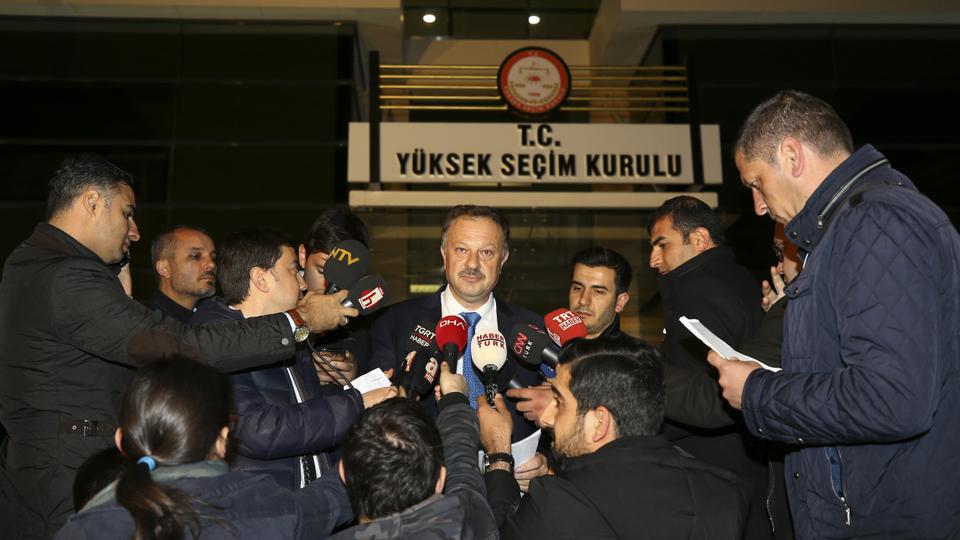
WASHINGTON — As Trump administration officials presided over the second day of an international conference in Warsaw dominated by calls to ratchet up pressure on Iran, one longtime U.S. ally and NATO member was noticeably absent — Turkey.
Snubbing the gathering in Poland, Turkish President Recep Tayyip Erdogan on Thursday attended a rival conference in the Black Sea resort of Sochi, where he planned to meet his Russian and Iranian counterparts to work out a final settlement of the war in Syria.
The dueling summits illustrate President Donald Trump's struggle to forge a united front against Iran, and reflect Turkey's drift away from Washington as it finds common ground with Moscow and Tehran, experts and former officials said.
Erdogan: 'John Bolton has made a very serious mistake'
JAN. 9, 201900:47
For decades, the U.S. could count on Turkey as a reliable partner that would line up with other allies against Iran and support Washington's strategic goals. But the political landscape has changed, U.S. influence in the region is in doubt, and Ankara is staking out an independent course, said Colin Clarke, senior research fellow at the Soufan Center, a New York-based think tank.
"I think we're seeing a realignment," Clarke told NBC News. "The U.S. has gone from the position where we called the shots, to where we are making mere suggestions to Turkey. That's a major sea change."
Turkey's relations with Washington have come under mounting strain since Erdogan was elected president in 2014, as the Turkish leader has pushed back on U.S. policies and carried out a crackdown on dissent. But the conflict in Syria has opened up the most dramatic divide between the two countries, with Ankara infuriated at Washington's support for Kurdish forces in Syria, which it sees as a terrorist threat.
When national security adviser John Bolton flew to Ankara in January, Erdogan refused to meet him and expressed outrage at U.S. demands that Turkey refrain from launching strikes against Kurdish fighters in northeastern Syria.

"We cannot swallow . . . the message that Bolton gave in Israel," the Turkish president said, and added that Bolton "probably doesn't know" the difference between ethnic Kurds and armed Kurdish groups.
With the U.S. planning to withdraw its small contingent of 2,000 troops in Syria within months, Turkey has recognized for some time it must reach an accommodation with Russia and Iran to safeguard its interests in Syria, experts said.
"The real power brokers in Syria are Iran and Russia," said Ilan Goldenberg, a former senior official under the Obama administration and now a senior fellow at the Center for a New American Security, a think tank.
The three countries meeting in Sochi have emerged as the dominant players in what appears to be the final phase of the Syrian civil war. Russia and Iran came to the aid of the Syrian regime of Bashar al-Assad and have succeeded in turning the tide of the conflict in Assad's favor.

Turkey cultivated Islamist rebel groups opposed to Assad that have been beaten back for the most part. But Russia and Iran need Turkey's help in squelching the rebels in their last strongholds in the northern province of Idlib, and Ankara needs Russian and Iranian cooperation to ensure Kurdish forces are kept in check and to pave the way for Syrian refugees to return, former U.S. diplomats said.
"I am confident that our trilateral summit on Syria will provide a new impulse toward stabilization in this country," Putin said before the talks began in Sochi.
In discussions with Ankara, U.S. officials have revived the idea of a protected "buffer zone" for the Kurds in the northeast, but Erdogan has said any such area would have to be coordinated with Russia.
When an uprising erupted in Syria in 2011, Erdogan had hoped to see Assad fall. But Turkey has since come to accept that Assad is firmly in place, and that the Syrian regime's patrons — Russia and Iran — will be needed to prevent a Kurdish state forming on Turkey's southern border, said Aykan Erdemir, a member of the Turkish parliament from 2011-2015.

"Turkey realizes it has lost in Syria. And the Kurdish issue has always been the top priority for Turkey," said Erdemir, now a fellow at the Foundation for Defense of Democracies, a hawkish think tank. And that "means you have to work with Russia," he said.
As U.N. peace talks on Syria foundered in recent years despite backing from the United States, Turkey joined up with Russia and Iran for an alternative peace process that soon overshadowed the U.N. effort, a result that made the United States look impotent, foreign diplomats and experts said.





No comments:
Post a Comment